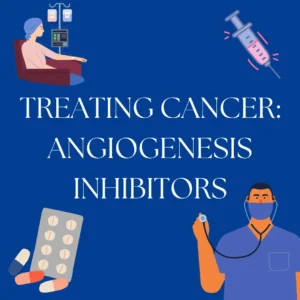Angiogenesis, the process of forming new blood vessels, is a crucial biological function that plays a role in both normal growth and healing as well as in abnormal conditions like disease. It involves the migration, growth, and differentiation of endothelial cells that line the interior of blood vessels. Chemical signals within the body control angiogenesis, with some signals stimulating the growth of new blood vessels and others inhibiting their formation. Normally, these chemical signals are balanced to ensure that blood vessels form only when and where they are needed. However, sometimes the balance can be disrupted, leading to abnormal blood vessel growth that can cause diseases, such as age-related wet macular degeneration.

In the context of cancer, angiogenesis plays a critical role in tumor growth and the spread of cancer cells. Solid tumors require a blood supply to grow beyond a few millimeters in size, and they can stimulate the formation of new blood vessels by releasing chemical signals. These new vessels provide growing tumors with oxygen and nutrients, enabling the tumor to enlarge and the cancer cells to invade nearby tissues and form metastases. To combat this, scientists have developed angiogenesis inhibitors, drugs that block tumor angiogenesis with the aim of preventing or slowing the growth of cancer by depriving it of its needed blood supply.
Angiogenesis inhibitors work by blocking the growth of blood vessels that support tumor growth rather than blocking the growth of tumor cells themselves. These drugs interfere with various steps in blood vessel growth, and some specifically target and bind to vascular endothelial growth factor (VEGF), preventing it from activating its receptor. Others may bind to VEGF and its receptor or other proteins involved in blood vessel growth. There are also immunomodulatory drugs with antiangiogenic properties. Angiogenesis inhibitors are typically given over an extended period, as they work by slowing or stopping tumor growth without killing cancer cells.
The FDA has approved numerous angiogenesis inhibitors for cancer treatment, most of which are targeted therapies developed to target VEGF or other molecules involved in angiogenesis. These drugs include Axitinib, Bevacizumab, Cabozantinib, Everolimus, Lenalidomide, Lenvatinib mesylate, Pazopanib, Ramucirumab, Regorafenib, Sorafenib, Sunitinib, Thalidomide, Vandetanib, and Ziv-aflibercept.
However, angiogenesis inhibitors can have side effects, including hemorrhage, arterial clots, hypertension, impaired wound healing, and protein in the urine. Some rare side effects may include reversible posterior leukoencephalopathy syndrome, gastrointestinal perforation, and fistulas. Agents that target the VEGF receptor can also cause fatigue, diarrhea, hypothyroidism, hand-foot syndrome, cardiac failure, and hair changes.
Here at the Halpern Law Firm, we are here for victims of mesothelioma. We want to make sure that all victims of mesothelioma get the compensation they deserve. If you have been diagnosed with mesothelioma and are interested in receiving compensation, call 800-505-6000 for a free case evaluation today. We are available 24/7.
Sources:
https://www.cancer.gov/about-cancer/treatment/types/immunotherapy/angiogenesis-inhibitors-fact-sheet

Written By Jeff Nelson
Don’t Wait—Contact an Experienced Pennsylvania Mesothelioma Attorney Today!
Now that you know the mesothelioma statute of limitations in Pennsylvania, contact an experienced attorney from our firm to represent your case before time runs out.
At Halpern Law Firm, we help clients throughout Pennsylvania, with offices in Philadelphia, Pittsburgh, Allentown, Scranton and Johnstown. Call us today for a free consultation at (800) 505-6000.
